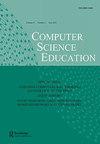Experiential serious-game design for development of knowledge of object-oriented programming and computational thinking skills
IF 2.2
Q1 EDUCATION & EDUCATIONAL RESEARCH
引用次数: 3
Abstract
ABSTRACT Background and Context Though still a nascent area of research, serious games have been presented as means of engaging students in computer programming and computational thinking due to their immersive and interactive nature. Existing research is limited in its ability to provide systems based on sound instructional design models, and only a few studies validate their design with statistical support. Objective This study investigated the effects of a game which is based on experiential learning theory under framework of the four-component instructional design model on undergraduate students’ learning performance in conceptual knowledge of object-oriented programming and computational thinking skills. Method A pre-test and post-test quasi-experimental design was used to study the effects of the experiential serious games on conceptual knowledge of OOP and CT skills of 61 non-engineering students with and without prior programming knowledge. Findings The statistical analyses reveal that students with and without programming experience significantly improved their understanding of fundamental concepts of OOP. There were only weak correlations among students’ creative problem solving, attitudes towards digital game-based learning of programming, and learning. Implications We provide several recommendations for researchers and practitioners for designing and developing an effective serious game to teach novice programmers computer programming.体验式严肃游戏设计的开发,具有面向对象的编程知识和计算思维技能
虽然严肃游戏仍然是一个新兴的研究领域,但由于其沉浸式和互动性,它已经成为吸引学生参与计算机编程和计算思维的一种手段。现有的研究在提供基于健全的教学设计模型的系统的能力上是有限的,只有少数研究用统计支持来验证他们的设计。目的研究四要素教学设计模型框架下基于体验式学习理论的游戏对大学生面向对象程序设计概念知识和计算思维技能学习绩效的影响。方法采用前测和后测准实验设计,研究体验性严肃游戏对具有和不具有编程知识的61名非工程专业学生OOP概念知识和CT技能的影响。统计分析显示,有和没有编程经验的学生对OOP基本概念的理解显著提高。学生创造性地解决问题、对基于数字游戏的编程学习的态度和学习之间只有微弱的相关性。我们为研究人员和实践者提供了一些建议,以设计和开发一款有效的严肃游戏来教授新手程序员计算机编程。
本文章由计算机程序翻译,如有差异,请以英文原文为准。
求助全文
约1分钟内获得全文
求助全文
来源期刊

Computer Science Education
EDUCATION & EDUCATIONAL RESEARCH-
CiteScore
6.90
自引率
3.70%
发文量
23
期刊介绍:
Computer Science Education publishes high-quality papers with a specific focus on teaching and learning within the computing discipline. The journal seeks novel contributions that are accessible and of interest to researchers and practitioners alike. We invite work with learners of all ages and across both classroom and out-of-classroom learning contexts.
 求助内容:
求助内容: 应助结果提醒方式:
应助结果提醒方式:


